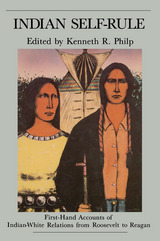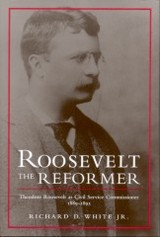
Franklin Delano Roosevelt, the author comments, "was one of those individuals who, because he rose to leadership in national and world affairs in times of crisis, threw a long shadow... his shadow lay over America for a long time in the sense that his absence was felt and comparisons with him persisted. He will continue to be a point of reference even when the inevitable processes of change have extinguished the problems he was so well suited to tackle." In this collection of essays, Rexford Tugwell seeks to explain this indomitable force. He explores Roosevelt's influence, assesses the means he used to achieve his ends, and penetrates some of the hidden places of his character. As stated in the preface to this volume, many of the mysteries surrounding Roosevelt will never be unlocked, yet, as evidenced throughout its pages, this study is an unrivaled success in its depiction of the man and the President.
In Search of Roosevelt begins with a revealing interview with Otis Moore, manager of Roosevelt's farm in Warm Springs, Georgia. The underlying intention here is to uncover the source of Roosevelt's emotional involvement in the problems of American agriculture. The work then proceeds with in-depth recollections of Roosevelt as individual, as reformer, and as uncommitted believer in a federally controlled balance of wages and prices.
These essays are inevitably tinged with nostalgia. Mr. Tugwell's relationship with Roosevelt was that of a confidant and an associate; he was a member of the so-called Brains Trust, and served under Roosevelt as Assistant Secretary and then Under Secretary of Agriculture (1933-1937), and, during the war years, as governor of Puerto Rico. He cannot bring to this study total indifference to the subject, but he does bring his insight as an astute political observer and historian.


Roosevelt the Reformer sheds light on an important chapter in the biography of the flamboyant 26th president of the United States. From 1889 to 1895—before he was a Rough Rider in the Spanish–American War and before he oversaw the building of the Panama Canal and won the 1906 Nobel Peace Prize—“Teddy” Roosevelt served as one of three civil service commissioners. This was a significant period of his life because he matured politically and learned how to navigate through Washington politics. He sparred with powerful cabinet officers and congressmen and survived their attempts to destroy him. He cultivated important friendships and allegiances, flourished intellectually, and strengthened his progressive views of social justice, racial theory, and foreign relations. It was a period altogether significant to the honing of administrative talent and intellectual acuity of the future president.
Richard White Jr. situates young Roosevelt within the exciting events of the Gilded Age, the Victorian era, and the gay nineties. He describes Roosevelt's relationships with family, friends, colleagues, and adversaries. Many of these people, such as Henry Cabot Lodge, Cecil Spring-Rice, Alfred Mahan, Henry Adams, and John Hay would significantly influence Roosevelt when he later occupied the White House. White explores TR's accomplishments in civil service reform, the effect of the commission experience on his presidency a decade later, and his administrative legacy.
In addition to Harvard University’s immense collection of Roosevelt
correspondence, White drew from original sources such as the Civil Service Commission files in the National Archives, the Library of Congress, the National Park Service Roosevelt Historical Site at Sagamore Hill, and the records of the National Civil Service Reform League.
READERS
Browse our collection.
PUBLISHERS
See BiblioVault's publisher services.
STUDENT SERVICES
Files for college accessibility offices.
UChicago Accessibility Resources
home | accessibility | search | about | contact us
BiblioVault ® 2001 - 2024
The University of Chicago Press









